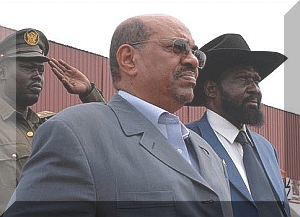Sudan Intrigues: Will the Center Hold ? Part 3

 |
| Bashir and Salva: What lies ahead for Sudan? |
The reawakening of tribalism was a misguided policy through which the regime intended to supplant party-based affiliation and revert to tribal loyalties, and thereby to pull the rug out from under the political parties in their traditional areas of influence. Among the gravest developments is the fact that the federal regime has begun to entrench tribalism by handing out positions according to the weight of the tribes.
There is a powerful trend towards ethnicizing conflicts and disputes and to strip them of all political or economic dimensions. Regional and tribal groupings and organizations have multiplied, both because the conditions of secrecy and oppression have curtailed the activity and movement of the political parties in the more remote regions, and because the regime has encouraged this vacuum to be filled by supporting the establishment of regional and tribal organizations. This is a dangerous game, the consequences of which were made apparent in the Darfur crisis. The regime strove to weaken the traditional influence of the Umma Party in the area by reviving tribal loyalty, which turned into racism when the tribes divided themselves into Arabs and Zurqa (a pejorative term meaning “Black Africans”). Many of these groupings then transformed into armed opposition movements as the regime was incapable of containing them, meeting their demands or redressing their grievances.
After tribal conflicts escalated into recurrent armed clashes, the regime is now seeking to call for what it refers to as “repairing the social fabric.” Traditional social relations have indeed been torn apart and what the Sudanese have in common has been lost. Darfur has now become the regime’s bleeding ulcer: the situation is critical and Darfuris are speaking about selfdetermination for the first time. On January 10th, 2010, during a visit to Juba to hold talks with the Government of the South and the SPLM, Yahya Bolad, Head of External Relations of the Sudan Liberation Movement (SLM), Abdul Wahid faction, stated that they would try to benefit from the experiences of the SPLM in the field of self-determination. He confirmed that his movement’s new vision consisted of placing the right to self-determination at the forefront of its actions, and that there would be no negotiations unless the right to selfdetermination of the people of Darfur was guaranteed to be on the agenda of future talks. Days before the Doha negotiations, the government and the SLM traded accusations of renewed fighting at Jebel Marra.
The SPLM accuses the NCP of stoking tribal feuds in the South, and of arming tribes hostile to the Dinka tribe, the backbone of the SPLM. Groups of international observers have warned of the renewal of fighting in the South should things continue on their current course. In case of secession, after a year, the problems that have been long simmering in the South would explode as a result of tribal divisions, corruption and the lack of security outside urban centers. The International Crisis Group shed light on these ethnic conflicts in 2009, reporting that 2,500 people were killed in acts of tribal violence, and that many of the victims were women and children who died in ruthless, well wellorchestrated attacks on the larger villages.
The central government is clearly no longer in control of the entire national territory thanks to its misguided approaches based on the principle of divide and conquer. These policies have backfired: the reins of power have slipped from its hands and it is now reaping the bitter fruit.
To be continued.
By Haydar Ibrahim
Director, Center for Sudanese Studies.
Courtesy: Arab Reform Initiative.
